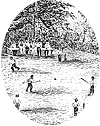In Blountville Circa 1850: Difference between revisions
Bsallardice (talk | contribs) (Edited automatically from page In Blountville Circa 1850undefined.) |
(Change Name from in Blountville Circa 1850undefined to In Blountville Circa 1850) |
||
| Line 1: | Line 1: | ||
{{Predecessor Game | {{Predecessor Game | ||
|Name= | |Name=In Blountville Circa 1850 | ||
|NY Rules=No - Predecessor | |NY Rules=No - Predecessor | ||
|Type of Date=Circa | |Type of Date=Circa | ||
Revision as of 13:10, 27 February 2024
| Date of Game | Circa 1850 |
|---|---|
| Game | Town Ball |
| Location | Blountville, TN, United States |
| Modern Address | |
| Field | Add Field Page |
| Home Team | Add Club Page |
| Away Team | Add Club Page |
| Score | |
| Has Source On Hand | No |
| Innings | |
| Number of Players | |
| NY Rules | No - Predecessor |
| Tags | |
| Description | During the long school hours, which began at eight o'clock in the morning and continued until four in the afternoon, there were three intermissions - one, an hour at noon and two called recesses. The noon hour was for dinner - the recess in the morning was a half past ten for fifteen minutes and the recess in the afternoon was at three and for the same length of time. During these intermissions the old time games were played - marbles, quoits, prisoner's base, bull-pen, town-ball, cat-ball, fox and hounds and antne-over. Prisoner's base was a running game. Two sides ere chosen, each selecting a base - the distance between them varying according to the space convenient, usually from thirty to fifty feet. To run around a base without being caught won a game. To be caught or tagged away from a base made a prisoner of the one caught, who was immediately taken to a place of detention[9] near the side capturing him. He could be retaken by his own side or exchanged as a prisoner of war. Bull-pen was a sort of four-cornered ball game. The lucky ones on the four corners had the privilege of handling the ball. They tossed it to and fro and at an opportune time hit one of the boys in the pen. The corner men then retreated to a stand and the one who had been hit by the ball had a chance to secure a base by hitting one of the boys that occupied them. Antne-over,[10] a corruption perhaps of ante-over, was played over a building - usually the schoolhouse. The sides took positions opposite each other - the building between. The party holding the ball would shout "antne" - the ones opposite would respond, "over," and the other again, "over she comes." If one of the party to whom the ball was thrown caught it the crowd then rushed around and captured, by hitting with the ball, one or more of the opposition. Town-ball was the forerunner of baseball. There were three bases and a home plate. Instead of tagging out a runner with the ball he was crossed out, the ball being thrown between him and the base. In other respects it was similar to the present popular and national game. Cat-ball was a timid game usually played by girls or small boys. It was a three-cornered game and a paddle instead of a bat was used to strike the ball. The author of this book was born in 1862. The date refereed to above is unclear, but probably c. 1850. The author grew up in Blountville. |
| Sources | Historic Sullivan by Oliver Taylor (1906) |
| Source Image | [[Image:|left|thumb]] |
| Has Source On Hand | No |
| Comment | Edit with form to add a comment |
| Query | Edit with form to add a query |
| Submitted by | Bruce Allardice |
| Submission Note | |
| First in Location | |
| Players Locality | Local |
| Entry Origin | |
| Entry Origin Url |
Comments
<comments voting="Plus" />
